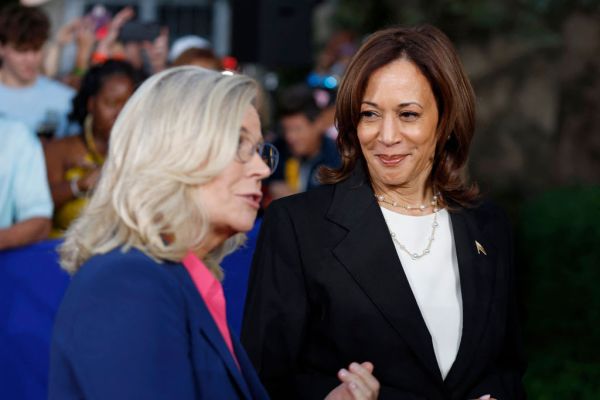Happy Monday! Election Day is 29 days away. If the two major-party candidates aren’t doing it for you, some are suggesting another option.
Up to Speed
- Former President Donald Trump returned on Saturday to the site of the first failed assassination attempt against him in Butler, Pennsylvania. Joining Trump as he rallied his supporters was a star-studded lineup that included vice presidential nominee Sen. J.D. Vance, X owner Elon Musk, and family members of Corey Comperatore, a rally attendee who was killed after being struck by a bullet meant for the former president in July. “Twelve weeks ago, we all took a bullet for America,” Trump said at the event. “All we are all asking is that everyone goes out and votes. We got to win.”
- Trump’s campaign capitalized on a comment from President Joe Biden that linked Vice President Kamala Harris to his legislative record. “We’re singing from the same song sheet,” Biden said at a Friday White House press briefing. “She helped pass all the laws that are being employed now. She was a major player in everything we’ve done, including passage of legislation which we were told we could never pass.” Soon after, the Trump campaign released a statement that pointed out that Biden’s briefing was concurrent with Harris’ rally. “Biden wanted to make it crystal clear that Kamala is tethered to every single one of his failures—and it worked. Kamala can run, but she certainly can't hide from the Harris-Biden record of failure,” the campaign wrote in a release.
- The nonpartisan Cook Political Report moved five competitive House districts toward Democrats on Friday. Most notably, it changed the races of Iowa Republican Reps. Zach Nunn and Mariannette Miller-Meeks from “lean Republican” to “toss-up,” a sign that the fight for control of Congress’ lower chamber is becoming tighter. Cook rates 26 districts as toss-ups, and, if Republicans win the 206 seats in which they are favored to win (not a guarantee for either party), they would need to win 12 toss-ups. If Democrats win all their favored seats, they would need 15.
Pennsylvania’s Urban-Rural Divide Makes It a Key Battleground

PITTSBURGH—Greetings from Steel City, where Dispatch Politics is taking this newsletter on the road. David M. Drucker and Mike Warren will be driving across Pennsylvania all week to report on the ground from what may end up being the deciding battleground state in the presidential election.
Democrats have won the Keystone State in every presidential election since 1992 except one, when Donald Trump broke through the “blue wall” in 2016 and picked up Pennsylvania, along with Michigan and Wisconsin. But the roughly 44,000-vote advantage he had over Hillary Clinton was not enough to build a lasting Republican coalition in Pennsylvania, and four years later, Joe Biden took the state and its 20 electoral votes by more than 80,000 votes.
Now, in 2024, Pennsylvania has one fewer vote in the Electoral College thanks to reapportionment, but it remains a crucial step on both Trump’s and Kamala Harris’ paths to victory. And polls show things are as tight as ever here, with the polling average at Real Clear Politics showing an actual tie between Trump and Harris. On October 7, 2020, Biden had a 7.1-point lead in Pennsylvania in the same polling average, and he ended up winning by 1.2 points, while Clinton had a 7.5-point lead on the same day in 2016 but lost the state by less than a point.
That recent history might have the Trump campaign feeling good about where things are, but the Republican nominee isn’t taking Pennsylvania for granted. Trump was here just this past weekend, revisiting the site of a July assassination attempt in Butler, about an hour north of Pittsburgh.
“We fought together. We have endured together. We have pushed onward together,” Trump said, speaking from the same spot where in July a gunman shot at him, grazing his ear and killing a supporter, Corey Comperatore. “And right here in Pennsylvania, we have bled together. We’ve bled.”
The political operative James Carville is often quoted as saying Pennsylvania is Philadelphia and Pittsburgh with Alabama in between. That portrayal is even less precise now than when he described it nearly four decades ago, but the caricature of an urban/rural split does illustrate why Trump remains competitive here—and why Democrats nonetheless regularly win statewide.
Trump is counting on maximizing turnout from Pennsylvania’s “T”—that is, the largely rural parts of the state between the two major metropolitan areas and across the northern tier that form the shape of the letter. But there are some exceptions within the T, including Erie County in the far northwest, which went narrowly for Trump in 2016 but swung back to Biden and the Democrats in 2020. Another bellwether is Northampton County in the Lehigh Valley back east along the Delaware River. Trump improving his numbers there and in neighboring (and slightly Democratic) Lehigh County would be a good sign for the Republican.
Harris, meanwhile, is trying to build upon Biden’s 2020 win by not just keeping the bellwether counties but by maximizing the vote in urban Philadelphia and Pittsburgh and upping the Democratic numbers in all those collar counties around Philly: Delaware, Montgomery, Chester, and Bucks. These are areas that got bluer as Trump has endured as the face of the Republican Party, but they’re also the sorts of places where Democrats might have a harder time making the pitch because concerns about inflation dominate. That’s why cultural issues, such as abortion access and gun violence, form a key part of the Harris suburban message.
The state of Pennsylvania is large, demographically and geographically diverse, and as politically divided as ever. This week, follow us here at Dispatch Politics as we tell its story from the ground.
Handicapping the Races for Control of the Senate

With less than a month to go until Election Day, Republicans are favored to take back control of the Senate, but it’s an outcome that is far from guaranteed. Betting markets and election forecasters still give Democrats a 29 percent chance of controlling the Senate—almost the exact same odds that Donald Trump had of winning in 2016, according to Nate Silver’s forecasting model at the time.
With Democrats currently holding a 51-49 majority in the Senate, Republicans need to net two Senate seats in November to take control in the event of aKamala Harris victory or net one seat in the event of a Donald Trump victory. A Vice President Tim Walz or a Vice President J.D. Vance would provide a tie-breaking vote if there is a 50-50 Senate.
Republicans are virtually certain to pick up one seat in West Virginia, where the retirement of Democratic Sen. Joe Manchin and the Senate candidacy of popular incumbent Republican Gov. Jim Justice has simply taken the race off the map.
Here’s a look at the math and the state of play in the 11 races that are at least somewhat competitive and will decide control of the upper chamber.
Five red states to watch.
Montana: Incumbent Democratic Sen. Jon Tester is trailing Republican Tim Sheehy by roughly 6 points—a bad place for an incumbent to be in October. Barring a big polling error or October surprise that shakes up the race, it seems unlikely Tester will be able to defy gravity in a state Trump won by 16 points in 2020.
Ohio: The Buckeye State, which Donald Trump carried by 8 points in 2016 and 2020, is the GOP’s next best chance to pick up a Senate seat, but the race between incumbent Democratic Sen. Sherrod Brown and Republican Bernie Moreno is closer to a toss-up. Brown has a 3-point lead in public polling, but a GOP campaign source tells Dispatch Politics recent internal Republican polling finds the race tied.
If Republicans defeat one or both incumbents in Montana and Ohio, Democrats would need to defeat the same number of incumbent Republicans to have a chance at maintaining Senate control with 50 seats.
Texas: When it comes to potential Democratic pickups, “I still think Texas represents the best opportunity,” Jessica Taylor of the Cook Political Report told Dispatch Politics. Incumbent Republican Sen. Ted Cruz won reelection in 2018 by just 2.3 points, and Trump carried the state by 5.5 points in 2020. Cruz leads Democrat Colin Allred by a few points in most public surveys, but his support is still under 50 percent—an uncomfortable place for an incumbent to be. “Cruz has two weaknesses that he didn’t have in 2018, and that’s abortion and Cancun,” Taylor said. In 2021, Cruz faced a backlash for flying to Cancun, Mexico, for a family vacation during a severe winter storm in Texas that left millions without power. Still, with Texas safely in Trump’s column, Cruz would have to run significantly behind the former president to lose, so Texas still looks tough for Democrats.
Florida: Florida is the only red state besides Texas where Democrats are spending millions to defeat an incumbent Republican. Trump carried the state by only 3.4 points in 2020, but Florida has gotten increasingly Republican since then. In 2020, there were about 100,000 more registered Democrats than Republicans in Florida, but in 2024, there are 1 million more Republicans than Democrats registered in Florida. Republican Sen. Rick Scott has only a slim lead in the polls over Democrat Debbie Mucarsel-Powell, a former House member, but Scott can use his personal wealth to fund his campaign to whatever extent necessary in the closing weeks of the campaign.
Nebraska: The only other red state where Democrats have a chance—and it’s a slim one—is Nebraska, where incumbent Sen. Deb Fischer is facing Democrat-turned-independent Dan Osborn. A recent SurveyUSA poll showed Osborn leading Fischer 45 percent to 44 percent, but this is a state Trump carried by 19 points in 2020, and it’s hard to see Fischer running that far behind Trump on Election Day. “I still think that the partisanship wins out,” Taylor said.
Five purple states to watch.
Michigan: Democrats are playing defense in five purple states, and the best opportunity for a GOP pickup among them is Michigan, according to Taylor, who rates the race a “toss up.” In the open-seat contest, Democratic Rep. Elissa Slotkin leads former GOP Rep. Mike Rogers by just a few points. “We saw a very significant shift among independents toward Rogers,” Taylor said of the Cook Political Report’s most recent poll of the state.
Wisconsin and Pennsylvania: The next best opportunities for GOP pickups could be Wisconsin, where incumbent Democratic Sen. Tammy Baldwin leads Republican Eric Hovde by less than 4 points, and Pennsylvania, where incumbent Democratic Sen. Bob Casey leads Dave McCormick by about 4 points. The Senate races in these two hotly contested “blue wall” states could turn on the outcome of the presidential race in each state. Hovde and McCormick, both centimillionaires, won’t be hurting for campaign cash in the closing weeks of the campaign.
Nevada and Arizona: GOP candidates are polling worse in the two Sun Belt battleground states where Democrats are playing defense. In Nevada, Democratic Sen. Jacky Rosen leads Republican Sam Brown by about 8 points. In Arizona, Democratic Rep. Ruben Gallego leads Republican Kari Lake by about 8 points in the race to replace outgoing Sen. Kyrsten Sinema.
“Rosen shouldn’t be doing that well because she’s the first-term senator in the state that is very transient and most of the electorate [turns] over every six years, and she has to reintroduce herself to voters. But she had the money to do that,” Taylor said. Gallego similarly had a financial advantage over Kari Lake, a deeply polarizing figure who lost the governor’s race in 2022, and that money advantage helped Gallego introduce himself to voters as a Marine veteran rather than by being defined by his progressive views and former membership in the Congressional Progressive Caucus.
One blue state to watch.
Maryland: In 2020, Trump lost Maryland by 33 points—making the state 4 points bluer than California—but former GOP Gov. Larry Hogan has been trying to defy the odds, as he’s done before. But Democrat Angela Alsobrooks leads him by 7.6 points in the RealClearPolitics polling average. “Voters look at a vote for governor and a vote for senator very differently,” said Taylor.
Sunday Show Rewind
- After Sen. J.D. Vance did not say in last week’s vice presidential debate whether former President Donald Trump lost the 2020 election, Republicans on the Sunday show circuit yesterday faced questions about it. Arkansas Sen. Tom Cotton said on NBC’s Meet the Press that President Joe Biden was elected in 2020, but he would not say Trump lost. “Joe Biden was elected in 2020. It was an unfair election in many ways. I mean, you had states that were changing their election practices or election laws, sometimes in violation of their constitution. You had networks combining with big tech to suppress what we now know to be a truthful story about Hunter Biden’s laptop and the evidence that it exposed about Biden family corruption,” Cotton told anchor Kristen Welker. When she pressed him on whether Trump lost, he would not say so, reverting back to his point that “Joe Biden was elected president.”
- House Speaker Mike Johnson faced a similar question on ABC’s This Week, deflecting rather than providing a clear answer. “This is the game that is always played by mainstream media with leading Republicans. It’s a gotcha game. You want us to litigate things that happened four years ago when we’re talking about the future. We’re not going to talk about what happened in 2020. We’re going to talk about 2024 and how we’re going to solve the problems of the American people,” he told George Stephanopoulos, adding that he would not “play the game.”
- Republican National Committee co-chair Lara Trump said her father-in-law would concede this year’s election so long as he believes it was conducted properly. “Assuming everything is free, fair, and transparent, absolutely. If Donald Trump loses this election, he has said himself he will be happy to accept those results,” she told Dana Bash on CNN’s State of the Union. She also touted the committee’s work on election integrity. “We are setting things up differently from the RNC’s standpoint, and we—instead of having to respond days, weeks, or months later to any issue that we might have—are going to have people in the room every time a vote is cast and counted, so that we can ensure if there is any question about anything, we’re addressing it right then in that moment,” she said.
Eyes on the Trail
- President Joe Biden will be in Washington, D.C., where he and first lady Jill Biden will be joined this morning by a rabbi and participate in a yahrzeit candle lighting ceremony to commemorate the one-year anniversary of the October 7 terrorist attack in Israel perpetrated by Hamas.
- Vice President Kamala Harris begins the day in Washington, D.C., where in the afternoon she and second gentleman Doug Emhoff will plant a memorial tree on the grounds of the vice president’s Naval Observatory residence to commemorate the October 7 attack. Afterwards, Harris will head to New York.
- Former President Donald Trump will participate in an event this evening marking the October 7 anniversary. The remembrance, attended by Jewish leaders, is being held at the Republican nominee’s Trump National Doral Golf Club in Miami. Trump also will deliver remarks.
- After spending yesterday in California for multiple campaign receptions, Minnesota Gov. Tim Walz will arrive in Washington state today in anticipation of a campaign reception there tomorrow. In the evening, the Democratic vice presidential nominee will appear on ABC’s late-night variety show, Jimmy Kimmel Live.
Notable and Quotable
“As I was saying … ”
—Former President Donald Trump at the start of his rally in Butler, Pennsylvania, as he gestured toward the chart that he turned to look at in July, a movement that likely thwarted the attempt on his life, October 5, 2024









Please note that we at The Dispatch hold ourselves, our work, and our commenters to a higher standard than other places on the internet. We welcome comments that foster genuine debate or discussion—including comments critical of us or our work—but responses that include ad hominem attacks on fellow Dispatch members or are intended to stoke fear and anger may be moderated.
With your membership, you only have the ability to comment on The Morning Dispatch articles. Consider upgrading to join the conversation everywhere.